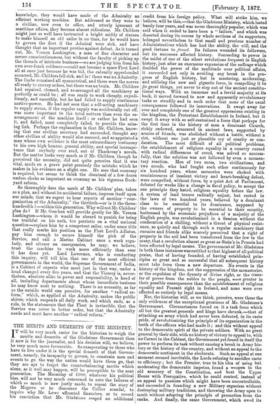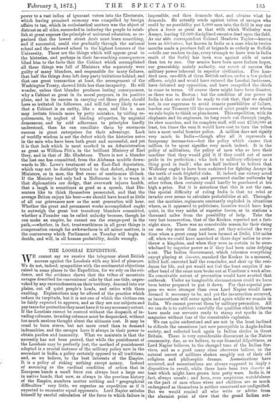THE MERITS AND DEMERITS OF THE MINISTRY.
IT will be very much easier for the historian to weigh the merits and demerits of the Gladstone Government than it now is for the journalist, and his decision will, we believe, be very mach more favourable. So exasperating to those who have to live under it is the special demerit of that Govern- ment, namely, its incapacity to govern, to constrain men and events to go the way the nation would have them go, that they are apt to forget the counterbalancing merits which alone, as it well may happen, will be perceptible to the next generation. The Macaulay of 1900, whatever his political bias, will not be very much concerned to note the failures of which so much is now justly made, to repeat the story of the Megmra or to denounce the Collier scandal, to inquire why Mr. Lowo affronted financiers, or to record his conviction that Mr. Gladstone reaped no additional credit from his foreign policy. What will strike him, we believe, will be this,—that the Gladstone Ministry, which lasted barely four years, and was never thoroughly popular, which was said when it ended to have been a "failure," and which was deserted during its course by whole sections of its supporters, belonged nevertheless to that small and precious number of Administrations which has had the ability, the will, and the good fortune to found. Its failures wounded its followers, but its successes affected history. Succeeding to power in the midst of one of the silent revolutions frequent in English history, just after an enormous expansion of the suffrage which doubled the power of the multitude over political affairs, it succeeded not only in avoiding any break in the pro- gress of English history, but in mastering, moderating, and utilizing the new and gigantic force, in compelling it to 410 great things, yet never to step out of the ancient constitu- tional ways. With an immense and a fervid majority at its back, it moved forward to new and apparently revolutionary tasks so steadily and in such order that none of the usual consequences followed its innovations. It swept away for ever and completely one of the greatest oppressions existing in the kingdom, the Protestant Establishment in Ireland, but it swept it away with so self-restrained a force that perhaps for the first time in the history of man a dominant Church, richly endowed, armoured in ancient laws, supported by armies of friends, was abolished without a battle, without a riot, without one just or plausible cry of cruelty or con- fiscation. The most difficult of all political problems, the establishment of religious equality in a country cursed with radical differences of creed, was solved so success- fully, that the solution was not followed by even a momen- tary reaction. Men of two races, two civilizations, and two creeds, who had fought each other continuously for six hundred years, whose memories were choked with reminiscences of insolent victory and heart-breaking defeat, were compelled, without force, by a quiet Act of Parliament, debated for weeks like a change in fiscal policy, to accept the one principle they hated, religious equality before the law. A system of land tenure radically unjust, but rooted in the laws of two hundred years, believed by a dominant class to be essential to its dominance, supposed by the owners of property to be essential to their security, buttressed by the economic prejudices of a majority of the English people, was revolutionized in a Session without the confiscation of a shilling, without a threat of physical resist- ance, so quietly and through such a regular machinery that enemies and friends alike scarcely perceived that a right of property in the soil had been transferred from the few to the many, that a revolution almost as great as Stein's in Prussia had been effected by legal means. The government of Mr. Gladstone in both these instances was entitled to that highest of all political praise, that of having founded, of having established prin- ciples so great and so successful that all subsequent history must take from them a new departure. No events in the history of the kingdom, not the suppression of the monasteries, or the expulsion of the dynasty of divine right, or the trans- fer of power from the nobles to the people, were greater in their possible consequences than the establishment of religious equality and Peasant right in Ireland, and none were ever effected so entirely by legal means. Nor, the historian will, as we think, perceive, were these the only evidences of the exceptional greatness of Mr. Gladstone's Government. Circumstances forced on it a task from which all but the greatest generals and kings have shrunk,—that of attacking an army which had never been defeated, in its caste pride, of revolutionizing the principle of its organization in the teeth of the officers who had made it ; and this without appeal to the democratic spirit of the private soldiers. With no great general by their side, with no history of victory to appeal to, with no Carnot in the Cabinet, the Government yet found in itself the power to perform its task without causing a break in Army his- tory or the history of the country, and without an appeal to the democratic sentiment in the electorate. Such an appeal at one moment seemed inevitable, the Lords refusing to sacrifice caste to efficiency ; but the Premier, true to his idea of using but moderating the democratic impetus, found a weapon in the old armoury of the Constitution, and beat the Upper House with Prerogative, which he could control, instead of an appeal to passions which might have been uncontrollable, and succeeded in founding a new Military organism without destroying military traditions, and throwing the Army open to merit without adopting the principle of promotion from the ranks. And finally, the same Government, which owed its
power to a vast influx of ignorant voters into the Electorate, which having promised economy was compelled by foreign affairs to tax, which in ecclesiastical matters was the object of distrust on all sides, succeeded in inducing the people to estab- lish at great expense the principle of universal education, so or- ganized that the lowest street Arab must learn something, and if successful, could rise gradually through the national school and the endowed school to the highest honours of the University. These are the things which will appear great to the historian, and perhaps in their far-reaching consequences blind him to the facts that the Cabinet which accomplished all these things was full of Ministers who separately were guilty of many blunders, and responsible for many failures, that half the things done left deep party irritations behind, and that one great transaction at least, the arrangement of the Washington Treaty, showed little less than incapacity. He will wonder, unless that blunder produces lasting consequences, why a Cabinet so great in its moral purposes, in its positive plans, and in its success in carrying out those plans, should have so irritated its followers, and will fail very likely to see that a Cabinet is an entity, like a man, and like a man may irritate friends more by petty mistakes, by trifling re- quirements, by neglect of binding etiquettes, by ungenial demeanour, and by cold adherence to principles hardly understood, than he can conciliate them by enormous success in great enterprises for their advantage. Lack of worldly wisdom is not the defect which the historian notes in the men who have been both great and successful, and yet it is that lack which is most marked in an Administration as great as William Pitt's, in the brilliant Ministry of Earl Grey, and in that of Mr. Gladstone. There is not a blunder the last one has committed, from the Alabama muddle down- wards to Mr. Lowe's treatment of an East-End deputation, which may not be distinctly traced to that defect, always in Ministers, as in men, the first cause of continuous ill-luck. If the Ministry had only had a Melbourne in it to warn it that diplomatists are dodgy, that overwork injures health, that a laugh is sometimes as good as a speech, that Dis- senters like to think themselves persecuted, and that the average Briton enjoys his beer—we should have heard as little of all our grievances now as the next generation will hear. Whether the great and permanent works accomplished ought to outweigh the great but transitory blunders committed, whether a Founder can be called unlucky because, though he can make an empire, he cannot see the orange-peel in the path,—whether, in fact, trustworthiness in all great things is compensation enough for awkwardness in all minor matters, is the controversy which Parliament on Tuesday will begin to decide, and will, in all human probability, decide wrongly.







































 Previous page
Previous page